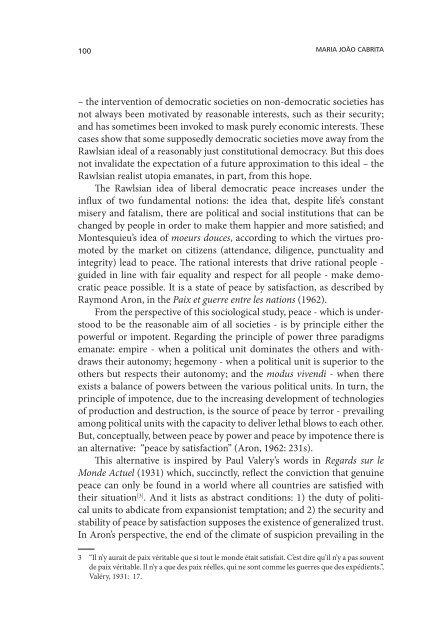Diacritica 25-2_Filosofia.indb - cehum - Universidade do Minho
Diacritica 25-2_Filosofia.indb - cehum - Universidade do Minho
Diacritica 25-2_Filosofia.indb - cehum - Universidade do Minho
You also want an ePaper? Increase the reach of your titles
YUMPU automatically turns print PDFs into web optimized ePapers that Google loves.
100<br />
MARIA JOÃO CABRITA<br />
– the intervention of democratic societies on non-democratic societies has<br />
not always been motivated by reasonable interests, such as their security;<br />
and has sometimes been invoked to mask purely economic interests. Th ese<br />
cases show that some supposedly democratic societies move away from the<br />
Rawlsian ideal of a reasonably just constitutional democracy. But this <strong>do</strong>es<br />
not invalidate the expectation of a future approximation to this ideal – the<br />
Rawlsian realist utopia emanates, in part, from this hope.<br />
Th e Rawlsian idea of liberal democratic peace increases under the<br />
infl ux of two fundamental notions: the idea that, despite life’s constant<br />
misery and fatalism, there are political and social institutions that can be<br />
changed by people in order to make them happier and more satisfi ed; and<br />
Montesquieu’s idea of moeurs <strong>do</strong>uces, according to which the virtues promoted<br />
by the market on citizens (attendance, diligence, punctuality and<br />
integrity) lead to peace. Th e rational interests that drive rational people -<br />
guided in line with fair equality and respect for all people - make democratic<br />
peace possible. It is a state of peace by satisfaction, as described by<br />
Raymond Aron, in the Paix et guerre entre les nations (1962).<br />
From the perspective of this sociological study, peace - which is understood<br />
to be the reasonable aim of all societies - is by principle either the<br />
powerful or impotent. Regarding the principle of power three paradigms<br />
emanate: empire - when a political unit <strong>do</strong>minates the others and withdraws<br />
their autonomy; hegemony - when a political unit is superior to the<br />
others but respects their autonomy; and the modus vivendi - when there<br />
exists a balance of powers between the various political units. In turn, the<br />
principle of impotence, due to the increasing development of technologies<br />
of production and destruction, is the source of peace by terror - prevailing<br />
among political units with the capacity to deliver lethal blows to each other.<br />
But, conceptually, between peace by power and peace by impotence there is<br />
an alternative: “peace by satisfaction” (Aron, 1962: 231s).<br />
Th is alternative is inspired by Paul Valery’s words in Regards sur le<br />
Monde Actuel (1931) which, succinctly, refl ect the conviction that genuine<br />
peace can only be found in a world where all countries are satisfi ed with<br />
their situation [3] . And it lists as abstract conditions: 1) the duty of political<br />
units to abdicate from expansionist temptation; and 2) the security and<br />
stability of peace by satisfaction supposes the existence of generalized trust.<br />
In Aron’s perspective, the end of the climate of suspicion prevailing in the<br />
3 “Il n’y aurait de paix véritable que si tout le monde était satisfait. C’est dire qu’il n’y a pas souvent<br />
de paix véritable. Il n’y a que des paix réelles, qui ne sont comme les guerres que des expédients.”,<br />
Valéry, 1931: 17.<br />
<strong>Diacritica</strong> <strong>25</strong>-2_<strong>Filosofia</strong>.<strong>indb</strong> 100 05-01-2012 09:38:23











![Programa [pdf] - cehum - Universidade do Minho](https://img.yumpu.com/17305425/1/190x135/programa-pdf-cehum-universidade-do-minho.jpg?quality=85)




